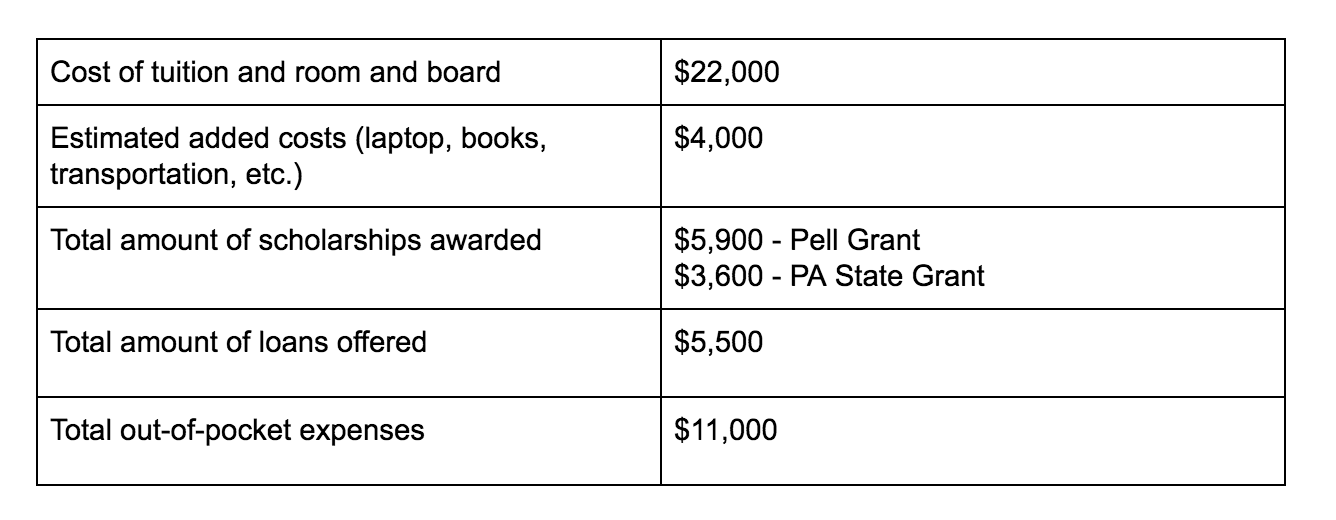
 $11,000. $11,00 for a student whose family’s EFC (Estimated Family Contribution) on the FAFSA (Free Application for Federal Student Aid) application was $0. $11,000 for a lifelong-resident of Pennsylvania with a GPA of over 3.0. Whereas other states offer accessible scholarships for all residents with successful GPAs to in-state public colleges and universities, Pennsylvania does not have such a program. This is not access to education; it is the slamming of a door. The vast majority of our students have done everything we, as a society, have asked of them. They have come to school every day. They have done the work. They have passed the classes. They have applied for the colleges and the scholarships. They have played the game and followed the rules. And still, when all is said and done, [pullquote position="right"]the university gates remain closed for the simplest and most unjust of reasons; they can’t pay the entrance fee.[/pullquote] The injustice of the moment weighs heavily in the gymnasium where families sit alongside teachers, analyzing the hard truths in the spreadsheet. For too many families, the $11,000 is simply prohibitive. There are no trust funds to turn to. There aren’t houses to borrow against. There isn’t a wealthy grandparent to ask for assistance. There is community college which, here in Philadelphia despite the tireless work of many, boasts an abysmal
10 percent graduation rate. Many meetings end in tears. A few have been offered exclusive scholarships that provide access to college, but most have not. Most families say they’ll talk it over and come to a decision. Some will try to raise funds. Some will attend community college. Some will decide that their life as a student will end at their high school graduation.
$11,000. $11,00 for a student whose family’s EFC (Estimated Family Contribution) on the FAFSA (Free Application for Federal Student Aid) application was $0. $11,000 for a lifelong-resident of Pennsylvania with a GPA of over 3.0. Whereas other states offer accessible scholarships for all residents with successful GPAs to in-state public colleges and universities, Pennsylvania does not have such a program. This is not access to education; it is the slamming of a door. The vast majority of our students have done everything we, as a society, have asked of them. They have come to school every day. They have done the work. They have passed the classes. They have applied for the colleges and the scholarships. They have played the game and followed the rules. And still, when all is said and done, [pullquote position="right"]the university gates remain closed for the simplest and most unjust of reasons; they can’t pay the entrance fee.[/pullquote] The injustice of the moment weighs heavily in the gymnasium where families sit alongside teachers, analyzing the hard truths in the spreadsheet. For too many families, the $11,000 is simply prohibitive. There are no trust funds to turn to. There aren’t houses to borrow against. There isn’t a wealthy grandparent to ask for assistance. There is community college which, here in Philadelphia despite the tireless work of many, boasts an abysmal
10 percent graduation rate. Many meetings end in tears. A few have been offered exclusive scholarships that provide access to college, but most have not. Most families say they’ll talk it over and come to a decision. Some will try to raise funds. Some will attend community college. Some will decide that their life as a student will end at their high school graduation.
Zachary Wright is an assistant professor of practice at Relay Graduate School of Education, serving Philadelphia and Camden, and a communications activist at Education Post. Prior, he was the twelfth-grade world literature and Advanced Placement literature teacher at Mastery Charter School's Shoemaker Campus, where he taught students for eight years—including the school's first eight graduating classes. Wright was a national finalist for the 2018 U.S. Department of Education's School Ambassador Fellowship, and he was named Philadelphia's Outstanding Teacher of the Year in 2013. During his more than 10 years in Philadelphia classrooms, Wright created a relationship between Philadelphia's Mastery Schools and the University of Vermont that led to the granting of near-full-ride college scholarships for underrepresented students. And he participated in the fight for equitable education funding by testifying before Philadelphia's Board of Education and in the Pennsylvania State Capitol rotunda. Wright has been recruited by Facebook and Edutopia to speak on digital education. In the wake of the COVID-19 pandemic, he organized demonstrations to close the digital divide. His writing has been published by The Philadelphia Inquirer, The Philadelphia Citizen, Chalkbeat, Education Leadership, and numerous education blogs. Wright lives in Collingswood, New Jersey, with his wife and two sons. Read more about Wright's work and pick up a copy of his new book, " Dismantling A Broken System; Actions to Close the Equity, Justice, and Opportunity Gaps in American Education"—now available for pre-order!
If you have a child with disabilities, you’re not alone: According to the latest data, over 7 million American schoolchildren — 14% of all students ages 3-21 — are classified as eligible for special...
The fight for educational equity has never been just about schools. The real North Star for this work is providing opportunities for each child to thrive into adulthood. This means that our advocacy...
The story you tell yourself about your own math ability tends to become true. This isn’t some Oprah aphorism about attracting what you want from the universe. Well, I guess it kind of is, but...
Your donations support the voices who challenge decision makers to provide the learning opportunities all children need to thrive.
Ed Post is the flagship website platform of brightbeam, a 501(c3) network of education activists and influencers demanding a better education and a brighter future for every child.
© 2020–2024 brightbeam. All rights reserved.